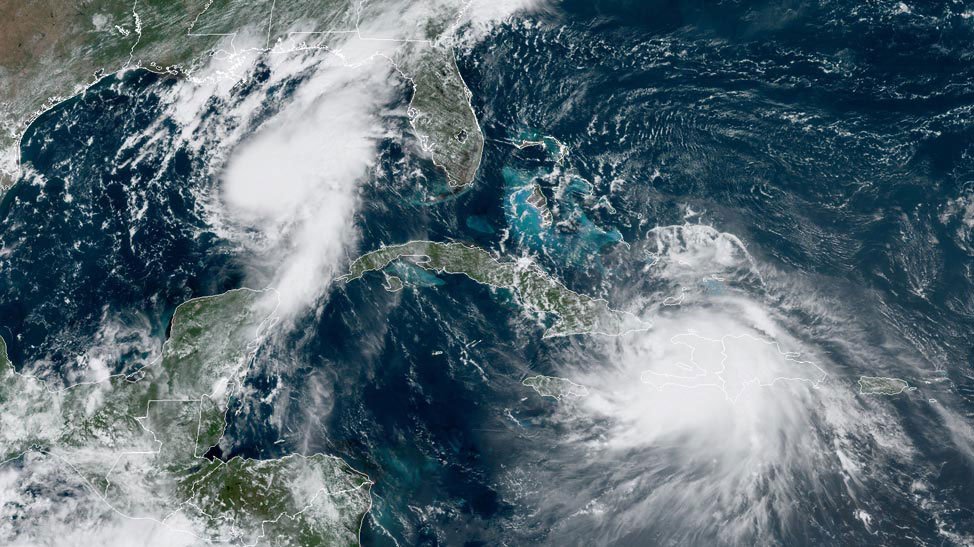MEDIA ADVISORY: AUGUST 24, 2020
2020 Hurricane Season: NSF-Funded Natural Hazards Experts Available for Comment

Visible GOES-16 satellite image of Hurricane Marco (left) and Tropical Storm Laura (right) at 12:50 p.m. EDT Sunday, August 23. (Image credit: NOAA/RAMMB, Yale Climate Connections.)
August 24, 2020 For the 2020 hurricane season, experts from the NSF-supported Natural Hazards Engineering Research Infrastructure (NHERI) are available to discuss hurricane-related topics. Currently, NHERI scientists are closely tracking Tropical Storms Marco and Laura, potential hurricanes bearing down on the Gulf Coast.
NHERI researchers are authorities in infrastructure damage from wind and storm surge, damage mitigation efforts, societal impacts in hurricane-prone regions and post-event data collection.
Storm damage to buildings and construction materials
Arindam Chowdhury co-directs the Wind Engineering Research lab at Florida International University. A wind engineer, Chowdhury tests the effect of hurricane-force winds and rain on buildings and construction materials at FIUs Wall of Wind, a facility where full-scale houses can be tested in conditions that most closely resemble those of a hurricane.
Email: Arindam.Chowdhury@fiu.edu
Phone: 305-348-0518
Field experiments in landfalling hurricanes
During hurricane season, University of Florida-based Forrest Masters heads into hurricane landfall zones and sets up live experiments to collect data on damaging winds, wind-driven rain and structural loading. In the laboratory, Masters conducts research on full-scale building systems subjected to realistic simulations of fluctuating wind load and rain conditions to evaluate their performance.
Email: masters@eng.ufl.edu
Phone: (352) 392-0946
Storm surge data and damage
University of Texas, Austin-based Clint Dawson models and simulates the coastal ocean with applications in hurricane storm surge, tsunamis, and environmental hazards such as oil spills. Using ADCIRC, He runs forecast models while hurricanes are approaching land, and he performs forensic studies to quantify the impacts of coastal disasters. He utilizes high-performance computing methods, big data, and scientific computing algorithms.
Email: clint@ices.utexas.edu
Phone: 512-475-8627
Instrumentation for post-hurricane data collection
The NHERI Natural Hazards Reconnaissance Facility (known as the "RAPID") based at the University of Washington provides investigators with equipment, software and support services needed to collect, process and analyze perishable data from natural hazard events, including hurricanes, windstorms, and floods.
Email: uwrapid@uw.edu
Phone: (206) 616-3318
Storm surge and wave impact on coastal communities
Daniel Cox at Oregon State University uses physical and numerical models to study the effects of surge and wave damage to coastal communities. At the O.H. Hinsdale Wave Research Laboratory, Dr. Cox studies wave impact on prototype scale building components, debris, sediment scour and erosion. He also studies how natural systems, such as mangroves and dunes, can be engineered to mitigate the effects of coastal surge and waves.
Email: dan.cox@oregonstate.edu
Phone: (541) 737-3631
Reconnaissance teams for post-hurricane data collection
After disasters, trained reconnaissance teams enter damaged areas to collect perishable data about physical damage and about social disruptions caused by natural hazards. To join a social science or engineering reconnaissance team or to learn about data collected, visit CONVERGE, the NSF-funded center that coordinates multi-disciplinary efforts and advances the science and ethical practice of post-disaster reconnaissance.
Email: converge@colorado.edu
Phone: (303) 492-9061
Fellow researchers and the general public are welcome to join NHERI discussion boards on Slack. Users must first create an account on the DesignSafe Cyberinfrastructure.
For general NHERI inquiries:
Marti LaChance
Communications Manager
nheri.communications@gmail.com







